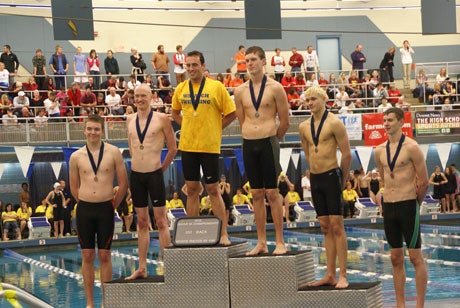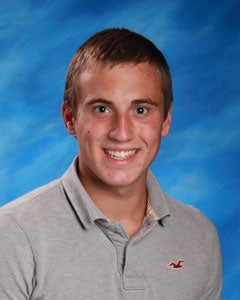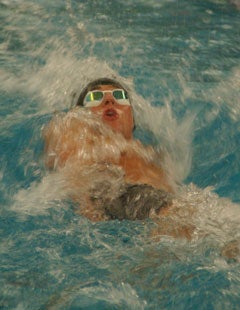
David Finley capped off a successful high school swimming career with a Utah 100-yard backstroke title. Now he's looking to use his talents in the armed forces.
Photo courtesy of Laurie Wynn
was introduced to swimming by his mother. Initially, he got in the water for no other reason than the fact that his friends did it with him.
Just a young kid living in California at the time, neither David nor his mom, Tonya, could have ever predicted what he would eventually contribute to the
Wasatch (Heber City, Utah) swim program.

David Finley
Photo courtesy of Laurie Wynn
"He changed the whole standard of Wasatch swimming," head coach Steve Marsing said, referring to David's abilities in the pool as well as his leadership and team ethic. "He set the tone."
Now a senior, David is graduating as a decorated athlete. The team captain qualified for the 3A state meet in seven different events across four seasons, earned five individual medals, six relay medals and played a major part in the team earning two second-place finishes and two first-place finishes — the first team swim championships in school history.
Indeed, David has contributed a great deal to his high school swim team. The greatest impact, however, seems to be the one Wasatch swimming has left on David.
Although his time as part of the Wasp boys swim team has come to a close, David's swimming career is far from over. This summer, he will join the Navy and begin training to become an aviation rescue swimmer. He will be using the skills he learned in the pool —the strokes, the strength and the teamwork — to save lives around the world.
You've got to swimTonya led David and his sisters, Rachel and Hannah, into swimming after a productive career of her own. Tonya was a Junior Olympic and national-level swimmer in her own right, and wanted to pass the benefits of the sport on to her family.
The love of swimming traveled with the family when the Finleys moved from sunny California to the small mountain town of Heber during David's middle school years. It was there, 40 miles east of Salt Lake City, where his family started the Mountain View Fellowship Evangelical church. His dad, Shane, is the minister. After the move, his mom jumped back into coaching swimming.
"When we moved here (Utah), I was wrestling at the time," David said. "My mom had started coaching here so I went to go talk to coach (Marsing) actually about water polo."
In Utah, water polo is a school-sponsored club sport, while swimming is sanctioned by the Utah High School Activities Association. Marsing told David the two were a package deal.
"Coach said, ‘If you want to play water polo, you've got to swim. That makes you a better water polo player,'" David remembered. "So I said, ‘All right, where do I go?'"
David primarily swam freestyle events for the Wasps, but stretched his range with other races. He wanted to swim backstroke, the event at which he said his mom "was a natural."
"Originally (Marsing) told me to never do backstroke in front of him again," David said. "(In eighth grade) I was pretty bad at it. He told me, ‘Just don't do it. It's embarrassing.'"
A good candidateFast forward four years to the summer of 2012 and David had become a state champion in relay events and the team competition. His senior season was still ahead of him and, as expected, David was looking into what to do after high school. He planned on going to college, working and possibly joining the Navy reserves.
"I was planning on going to college in Sacramento (Calif.) and working there. I decided I would get some extra money and see what the reserves had to offer," he said.
When he got to the recruiting office, however, the officers he spoke with introduced a different path.
"I got a little background information and found out he was a member of a swim team, so I asked some more questions and got him interested in our air rescue swim program," said Harry Meyer, petty officer first class. "He's actually a very talented guy, a really good swimmer, so we thought he'd be a good candidate for that program."
David admits the conversation shocked him. Although he had always had an interest in joining the military, commitments to his family and long-term girlfriend, Morgan, had him rethinking the risk of active duty.
"(The recruiters) showed me air rescue — very little combat, a lot of saving people, a job I could do to the best of my abilities, serve my country and of course provide for my family," David said. "The whole hour-and-a-half drive back home, I kept getting more and more excited about it. This is something where I get to see the world and hopefully make a difference in somebody's life."
An elite programAviation Rescue Swimmers (AIRR) is part of the Navy's elite search and rescue team, according to information provided by the Navy. The role of this team expands from medical evacuation and anti-submarine warfare to airborne firefighting and law enforcement support, and everything in between.
"(He) could be working in anything from open waters to rivers; he could be stationed on a ship, stationed with a squadron, he could be connected to a helicopter squadron," said Eric Gibb, petty officer second class. "The versatility of his job is going to be anywhere the Navy is dealing with water."
"He also is going to be responsible for responding to natural disasters, for instance Hurricane Katrina or when things like that happen," added William Vigil, petty officer second class. "It's a lot of our rescue swimmers that will go in and do the humanitarian support as well."
As an elite program, AIRR requires an initial tryout in addition to fulfilling requirements to get into the Navy, and then involves extensive training after completing boot camp.
"The tryout is called our PST, or physical screening test," said Gibb. "It consists of a 500-yard swim, as many pushups as you can do in two minutes, as many sit ups as you can do in two minutes, maximum amount of pull-ups and a mile-and-a-half run."
The other specialized programs that require passage of the PST are the Navy SEALS, special weapons combat crewmen, explosive ordinance disposal and the Navy divers.
Daivd passed the tryout in his first attempt and, as expected, was told his swim time was one of the fastest the recruiters had seen.
"To be competitive you want it under about 9 minutes," he said. "I did mine in about 5:50."
Full circleThe humanitarian work within the job description captured David's attention and, while his family and friends are nervous about his entrance into the military, they know he has found a way to do what drives him.
"I'm excited to see him use his swimming to do something," Tonya said. "He didn't want to swim in college, which was kind of a shame, but it was exciting to see he's going to be using it for even greater good. He's a great leader and he's got his heart in the right place."
David's swim coach echoed those sentiments.
"I think it's a great challenge for him," said Marsing. "Anything that makes these young people work hard for a good cause and a good reason, I love it. And what a great way to honor our sport."
David's grandfather and Tonya's dad, David Kelly, also served in the Navy, and both are pleased to see the family legacy live on.
"(David Kelly) passed away when he was 29 and I was 4," Tonya said. "I never knew his stories about the Navy; it's interesting that it came full circle."
Championship runWith all the change moving into place for his near future, David's final trip to the state swim meet last week was a special event.

David Finley swimming the backstroke.
Photo courtesy of Laurie Wynn
Not only did his team win its second state championship and his relay teams win both the 200-yard medley relay and 400-yard freestyle relay, but it was this meet, in front of his family and girlfriend (who had
flown in from Louisiana) that David won his first and only individual
medal, in the 100 backstroke. To top it off, he got to stand on the swim deck with his mom and watch his sister Rachel, a sophomore, help the Wasatch girls team win its first state title.
"When he was an eighth grader, it was that bad," Marsing said after David's championship swim of 54.92 seconds. "He just wouldn't listen to me and I just got tired of watching it. I said, ‘You know what? If you're going to do it that way, don't do it anymore.' And now he's a state champion."
The coming months will involve tying up loose ends at school, saying goodbyes to family and friends, and continued work to maintain his physical shape. A proud son and older brother, he will miss being involved in the daily life of his tight-knit family. David feels, though, that with the preparation his parents and swimming have provided him, he will now be able to make a difference in the world.
"I don't want to be a hero or anything, and I know a lot of people go into it thinking that, but I do want to help people however I can," he said. "After this is done, I definitely want to stay in this field and maybe do Life Flight, firefighter, something that I can just continue to serve and hopefully make a difference in somebody's life."
